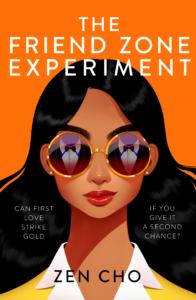Zen Cho on her debut romance novel, The Friend Zone Experiment
"It’s a chance to immerse yourself in a different world, an escape from the everyday grind."
This post was written by Zen Cho, author of The Friend Zone Experiment.
I started writing romance by accident.
In 2021, I was struggling to manage the competing demands of a big job, a small child, and a medium-sized career as a fantasy author. Like everyone else, I was also dealing with the pressures of a global pandemic. I was sleep-deprived, stressed as hell, and in need of an escape.
But not just any escape. The months of lockdown had had a curious effect on my imagination. For once, escaping into worlds of magic, dragons, gods and ghosts – all the various charms in a fantasy writer’s spell book – wasn’t doing it for me. All I wanted to imagine, in fact, was having the freedom to jump on a train to London, where I had previously lived for nearly a decade, to have dinner with a friend at a favourite restaurant.
I was lonely. Parenting a small child is like writing a novel: it is all-consuming and can be incredibly isolating, especially if you’re doing it at a time when a virus has cut you off from your usual support networks. I was, in fact, ripe to fall in love. So I did – with kdramas.
I found in kdramas the escape I’d been looking for. Not into worlds of magic – though there are many kdramas with fantastical settings – but into the wish fulfilment fantasies the genre is so good at delivering. Along with a gleeful indulgence in fun tropes and casts of astoundingly beautiful people, the shows had a commitment to emotion and focus on character relationships that lent a real depth and force to the stories they told.
View this post on Instagram
I’d always enjoyed romance and included elements in my fantasy, but I started writing a book that foregrounded romance, inspired by the kdramas I was watching. THE FRIEND ZONE EXPERIMENT was a love story with a contemporary setting, featuring characters who were idealised but grappling with issues we all face. How do we navigate the tangle of expectation, debt, love and resentment in our relationships with our families? What does it mean to be a good person in our modern world? How do we summon the courage to love and be loved after being hurt?
Set in London, THE FRIEND ZONE EXPERIMENT follows Renee, a Singaporean entrepreneur, who reconnects with her university crush Ket Siong, a Malaysian pianist, 10 years after he broke her heart. As they start falling in love again, they must reckon with family pressures, career ambitions, and the complexities of navigating a world shaped by dirty money and corrupt politics.
Though it’s a departure from my previous fantasy novels, in some ways, it’s not that different. Like fantasy, romance takes place on a different plane of reality, with its guarantee of happy endings, and its unabashed celebration of (often, though not always, female) pleasure and desire. The readers are voracious, smart, and fluent in the tropes and conventions of the genre – each book is a contribution to a long-running conversation.
Reading and writing romance gives me a similar release to that I find in fantasy. It’s a chance to immerse yourself in a different world, an escape from the everyday grind. But in each case, the conventions of the genre, imposing a deliberate distance from reality, freed me to think about complicity and the impact of politics on individual lives.
You could say that I found in romance a way to examine the deeply serious and important through the lens of the frivolous. But that’s only if you assume love stories and happy endings are inherently frivolous. Romance – like all the best literature – is about the grand mysteries of the heart and mind. My venture into the genre has been immensely fulfilling. I hope readers will find some of the same rewards in reading the book, as I have derived from writing it.



 The Friend Zone Experiment by Zen Cho, hardback, Macmillan, £18.99
The Friend Zone Experiment by Zen Cho, hardback, Macmillan, £18.99